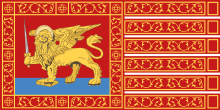


Venetian nationalism (also Venetism,[1] from the Venetian/Italian name, venetismo) is a nationalist, but primarily regionalist, political movement active mostly in Veneto, Italy, as well as in other parts of the former Republic of Venice.
Generally speaking, Venetists promote the distinct Venetian identity and the rediscovery of the Republic of Venice's heritage, traditions, culture, and language and/or demand more autonomy or even independence for Veneto from Italy.[2][3][4] According to journalist Paolo Possamai, Venetism is "the strain of Veneto and Venetians toward the recognition of their identity and autonomy".[5] Venetism is a broad movement,[6] which definitely includes Venetist parties, notably Liga Veneta, but also encompasses people from several political parties. In 1982 Goffredo Parise, a writer and journalist, wrote: "Veneto is my fatherland. [...] Even if a Republic of Italy exists, this abstract idea is not my Fatherland [...]. We Venetians have travelled throughout the world, but our Fatherland, that for which we would fight if it were necessary to fight, is Veneto. [...] When I see "River sacred to the Fatherland" written on the bridges spanning the Piave, I am moved, not because I think of Italy, but rather because I think of Veneto."[7][8]
Most Venetists consider Veneto a nation distinct from Italy and some refuse the validity of the result of the referendum through which Veneto (or, better, Venetia) was united with Italy in 1866.[9][10][11][12] Some of them have long proposed a re-edition of that referendum and campaign for the independence of Venetia, a country that would be composed of the territories of the historical Venetian Republic, covering Veneto, Friuli-Venezia Giulia, and large chunks of Lombardy (the province of Brescia, the province of Bergamo, the area around Crema and a portion of the province of Mantua).[13] The proposal, regarding to Veneto alone, has more recently gained the support of Liga Veneta, the Government of Veneto, and the majority of the Regional Council of Veneto, which endorsed a bill aimed at organising the referendum in 2014. The Constitutional Court ruled that referendum out as contrary to the Constitution, but authorised an autonomy referendum, which took place on 22 October 2017: 57.2% of Venetians participated in the referendum and 98.1% voted "yes". Consequently, President of Veneto Luca Zaia started a negotiation with the Italian government.
Although it usually refers to the whole Venetian autonomist movement,[14] the term "Venetism" is sometimes used to identify specifically culture-oriented Venetists, hardline Venetists or those Venetists who refuse the concept of Padania, a proposed country by Lega Nord / Lega, of which Liga Veneta (the most successful Venetist party so far) has been the "national/regional" section in Veneto. Alberto Gardin, a pro-independence publisher and later self proclaimed 121st Doge[15] who supports the boycott of Italian elections, offers another interpretation by considering "Venetism" a "partisan concept, that is part of the Italian political system (Venetists, as Socialists, Communists, PD, PdL, etc.)".[16]
- ^ "Venice Wants to Secede from Italy". VICE. 21 March 2014. Retrieved 23 August 2015.
- ^ "Perché il Veneto non si sente Italia". 8 August 2017.
- ^ ""Veneto Texas d'Italia": l'Analista politico Giovanni Collot di Conegliano in redazione". 17 September 2017.
- ^ "La questione Veneta". 23 October 2017.
- ^ Francesco Jori, Dalla Łiga alla Lega. Storia, movimenti, protagonisti, Marsilio, Venice 2009, p. 98
- ^ "Dai venetisti "anni '20" all'assalto del Campanile, ribellismo mai sopit"". 22 October 2016. Archived from the original on 24 October 2016. Retrieved 24 October 2016.
- ^ Goffredo Parise, Corriere della Sera, 7 February 1982
- ^ "Il Veneto è la mia Patria" (in Italian). Archived from the original on 21 February 2016.
- ^ Ettore, Beggiato (1998). 1866: la grande truffa. Padua: Editrice Universitaria.
- ^ Borsetto, Giampaolo (2006). Venezia 1866: el grande inbrogio. El plebisito de l'anexion a l'Italia. Treviso: Raixe Venete.
- ^ Zanon, Luigi (2000). "1866: anno della vergogna italiana. 19 ottobre 1866: giorno di lutto per le genti venete" (PDF). Archived from the original (PDF) on 15 July 2011.
- ^ "L' Italia è occupante abusivo del Lombardo-Veneto | L'opinione di Loris Palmerini". Palmerini.net. 2 August 2007. Retrieved 18 October 2011.
- ^ "Venetia". Iveneti.org. Archived from the original on 1 October 2011. Retrieved 18 October 2011.
- ^ "Veneto, autonomisti anche a sinistra – Repubblica.it " Ricerca". Ricerca.repubblica.it. 16 October 2006. Retrieved 18 October 2011.
- ^ "Venezia ha il suo 121° doge, eletto alberto gardin". 23 October 2016.
- ^ ""INDIPENDENZA VENETA" / cena lavoro 15 aprile 2009". Forum Radicali.it. 21 September 2008. Retrieved 18 October 2011.